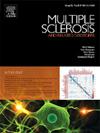多发性硬化症复发临床报告
IF 2.9
3区 医学
Q2 CLINICAL NEUROLOGY
引用次数: 0
摘要
背景:多发性硬化症(MS)复发临床可以导致MS复发的早期诊断和管理,但发表的MS复发临床结果很少。方法对贝尔法斯特健康与社会护理信托基金(BHSCT) 12个月的复发门诊进行分析。结果只有16%的参与者被诊断为复发,复发定义为新的神经系统症状和新的疾病活动的放射证据。假性复发比复发更常见(19%)。3%的出勤人员接受皮质类固醇治疗。结论:这一较低的数字强调了临床评估新症状的重要性,证明了皮质类固醇处方的谨慎性,并可能反映了高效治疗的影响。我们鼓励其他团体发表他们的复发临床研究结果,以最好地描述复发的频率和使用真实世界数据的此类服务的效用。本文章由计算机程序翻译,如有差异,请以英文原文为准。
Results from a multiple sclerosis relapse clinic
Background
A multiple sclerosis (MS) relapse clinic can lead to early diagnosis and management of MS relapses, yet published outcomes from MS relapse clinics are scarce.
Methods
We analysed the Belfast Health and Social Care Trust (BHSCT) relapse clinic over a 12 month period.
Results
Only 16 % of attendees were diagnosed with a relapse, defined as new neurological symptoms with radiological evidence of new disease activity. Pseudorelapse was a more common cause of presentation (19 %) than relapse. Corticosteroid therapy was administered in 3 % of all attendances.
Conclusions
This low figure highlights the importance of clinical evaluation of new symptoms, justifies caution in corticosteroid prescribing and may reflect the impact of highly-effective therapies. We encourage other groups to publish their relapse clinic findings to best characterise the frequency of relapses and the utility of such services using real world data.
求助全文
通过发布文献求助,成功后即可免费获取论文全文。
去求助
来源期刊

Multiple sclerosis and related disorders
CLINICAL NEUROLOGY-
CiteScore
5.80
自引率
20.00%
发文量
814
审稿时长
66 days
期刊介绍:
Multiple Sclerosis is an area of ever expanding research and escalating publications. Multiple Sclerosis and Related Disorders is a wide ranging international journal supported by key researchers from all neuroscience domains that focus on MS and associated disease of the central nervous system. The primary aim of this new journal is the rapid publication of high quality original research in the field. Important secondary aims will be timely updates and editorials on important scientific and clinical care advances, controversies in the field, and invited opinion articles from current thought leaders on topical issues. One section of the journal will focus on teaching, written to enhance the practice of community and academic neurologists involved in the care of MS patients. Summaries of key articles written for a lay audience will be provided as an on-line resource.
A team of four chief editors is supported by leading section editors who will commission and appraise original and review articles concerning: clinical neurology, neuroimaging, neuropathology, neuroepidemiology, therapeutics, genetics / transcriptomics, experimental models, neuroimmunology, biomarkers, neuropsychology, neurorehabilitation, measurement scales, teaching, neuroethics and lay communication.
 求助内容:
求助内容: 应助结果提醒方式:
应助结果提醒方式:


